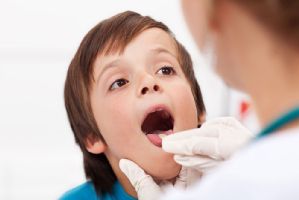
Tick Bites - What To Do
Author: Nicole Marty, MD
I see a tick on my child's body, how do I remove it?
- Use fine-tipped tweezers to grasp the tick as close to the skin's surface as possible.
- Pull upward with steady, even pressure. Don't twist or jerk the tick; this can cause the mouth-parts to break off and remain in the skin. If this happens, remove the mouth parts with tweezers. If you are unable to remove the mouth parts or head easily with clean tweezers, leave it alone and let the skin heal.
- After removing the tick, thoroughly clean the bite area and your hands with rubbing alcohol or soap and water.
- Never crush a tick with your fingers. Dispose of a live tick by putting it in alcohol, placing it in a sealed bag/container, wrapping it tightly in tape, or flushing it down the toilet.
Can my child get Lyme disease from this bite?
The tick must be attached and feeding for at least 48 hours in order to transmit Lyme disease. A small, non-engorged tick that is walking on the surface of the skin, or is easily removed is not capable of giving your child Lyme disease. Try to think about the last time your child was outside and may have possibly come into contact with a tick. It is important to remember that Lyme disease is much less likely because removal of the tick within two to three days of attachment usually prevents transmission of Lyme disease. More commonly, Lyme disease is transmitted by the unrecognized tick that feeds to repletion (about four to five days) and then falls off without the person knowing that he or she has been bitten.
Should my child get antibiotics to prevent Lyme disease?
Usually, your child will NOT need antibiotics to prevent Lyme disease. Your provider may consider a single dose of antibiotics to prevent Lyme disease if he/she meets ALL of the following criteria:
- Attached tick identified as a deer tick
- Tick is estimated to have been attached for ≥36 hours
- The antibiotic can be given within 72 hours of the tick bite
- The child is older than 8 years of age and can take the antibiotic doxycycline
Even if your child meets all of the above criteria, he/she may still not need antibiotics. You and your child's provider may decide to simply observe the child for signs or symptoms of Lyme disease and treat with antibiotics only if these develop. If your child meets all of the above criteria and you would like to talk with your provider about a dose of antibiotics, please call our office during regular business hours at (715) 830-0732.
How do I know if the tick that I removed from my child is a deer tick?
Deer ticks are brown and approximately the size of a poppy seed or pencil point.
Dog ticks are brown with a white collar and about the size of a pencil eraser (larger than a deer tick).
Should my child be tested for Lyme disease right away?
There is no reason to test your child's blood for Lyme disease at the time of the tick bite because even people who become infected will not have a positive blood test until approximately two to six weeks after the bite.
What are the signs and symptoms of Lyme Disease?
Observe the site of the bite for a red rash that is expanding. It will develop into a spot that often looks like a "bullseye". If you see this rash on your child, please call our office during regular business hours at (715) 830-0732 to make an appointment for your child to be seen. You do not need to bring your child to urgent care unless he/she is significantly ill along with having the rash.
The rash is seen in early Lyme disease, later signs and symptoms include:
- Headaches
- Joint swelling/pain
- Drooping of one side of the face
- Dizziness
- Shortness of breath

Related Articles

Pediatric Medicine
Strep/Sore Throat
My child has a sore throat, how do I know if it is strep throat? It is important to remember that...

Pediatric Medicine
Fever FAQ
Most of the time, fever is not a medical emergency and can wait until the next morning to be seen in...

Pediatric Medicine
Rash after Fever
Fever followed by a rash is common in children. The most common cause is a viral illness called...

Pediatric Medicine
Diarrhea and Vomiting
Vomiting and diarrhea are common in childhood and are most often caused by a viral infection....
